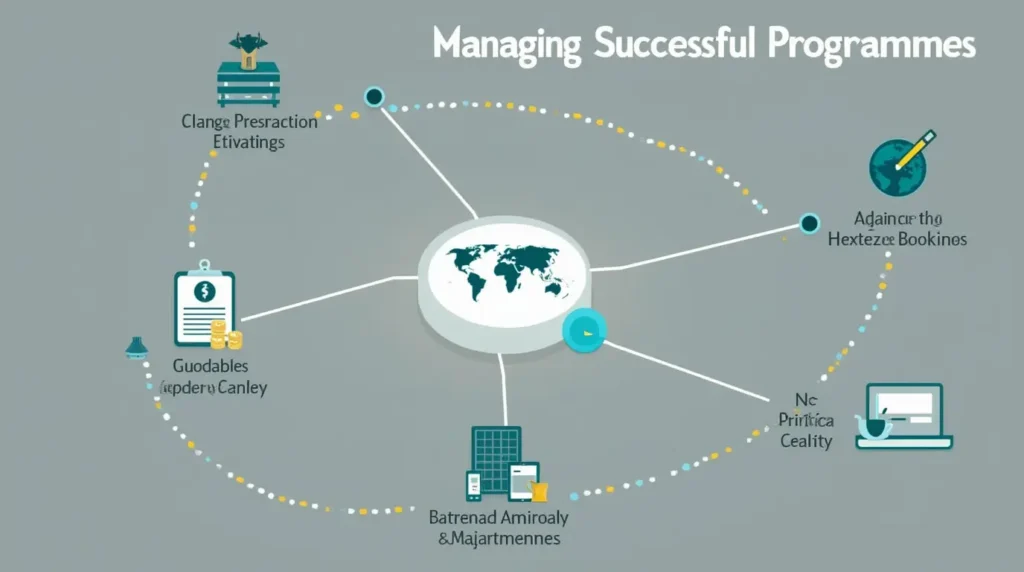In today’s rapidly evolving business landscape, organizations face the constant challenge of implementing strategic changes effectively. Managing Successful Programmes (MSP) emerges as a robust framework designed to navigate these complex transformation processes. Far more than just a project management tool, MSP provides organizations with a structured approach to managing change while maintaining focus on their strategic objectives.
At its core, MSP addresses the fundamental challenges that organizations encounter during major transformations. These include coordinating multiple change initiatives, ensuring stakeholder engagement, optimizing resource allocation, and managing associated risks. By breaking down large-scale changes into manageable projects, MSP creates a clear pathway for transformation while maintaining sight of the broader organizational goals.
Understanding the Core Elements of MSP
The MSP framework stands on three foundational pillars that work in harmony to deliver successful transformational change. First, the MSP Principles serve as guideposts derived from extensive practical experience and lessons learned from past programs. These principles provide organizations with clear metrics to measure their transformation success and ensure they stay on track throughout the change process.
Second, MSP Governance Themes outline how organizations should approach program management. These themes emphasize the critical importance of strong leadership, well-structured implementation teams, and robust organizational frameworks. They provide the necessary oversight and control mechanisms to ensure program success.
The third pillar, the MSP Transformational Flow, offers a comprehensive roadmap through the entire program lifecycle. From initial conception to final delivery of results, this element guides organizations through each stage of their transformation journey, ensuring no critical steps are overlooked.

Defining Clear Roles and Responsibilities
One of MSP’s greatest strengths lies in its clear delineation of roles and responsibilities. The framework establishes a hierarchical structure that ensures effective program delivery through well-defined responsibilities at every level.
At the top sits the Sponsoring Group, which operates at the decision-making level. This group bears responsibility for key business and investment decisions, establishing the parameters within which change can occur. The Senior Responsible Owner (SRO) acts as the primary change agent, creating a vital link between the Sponsoring Group and the Program Manager.
The Program Manager plays a crucial role in coordinating and controlling individual projects within the broader program scope. Working alongside them, the Business Change Manager focuses on implementing measurable improvements in business processes, ensuring that changes deliver tangible benefits to the organization.
Supporting these roles, the Programs Office serves as the central hub for information flow, communication, and monitoring. This office provides essential expertise in critical areas such as finance, scheduling, resource management, and training, ensuring all program elements operate smoothly and efficiently.
Driving Organizational Progress Through MSP
MSP’s value proposition extends beyond mere project management. The framework enables organizations to implement change through clear responsibilities and structured procedures, ensuring that transformation initiatives align closely with corporate strategy. This alignment is crucial for ensuring that change initiatives remain realistic and achievable while delivering meaningful business value.
By focusing on identifying, implementing, and managing benefits, MSP helps organizations drive change effectively. The framework’s structured approach ensures that organizations can track and measure the impact of their transformation efforts, making adjustments as needed to optimize outcomes.

SERVIEW’s Commitment to MSP Excellence
SERVIEW stands at the forefront of MSP implementation, offering comprehensive training and consulting services to organizations embarking on their transformation journeys. Understanding that different organizations have varying needs, SERVIEW provides flexible training formats that accommodate diverse learning styles and organizational requirements.
The company’s commitment to excellence extends to its examination framework, which includes free retakes, demonstrating their dedication to ensuring participants master the MSP methodology. Customer testimonials consistently highlight satisfaction with SERVIEW’s training services, praising both the quality of instruction and the practical approach to training delivery.
Conclusion
MSP represents a comprehensive framework for navigating complex change processes in modern organizations. Through its emphasis on structure, clear roles, and strategic alignment, MSP enables organizations to manage change effectively while ensuring projects remain aligned with broader business objectives. As organizations continue to face increasingly complex transformation challenges, MSP provides the tools and framework necessary for successful program delivery and sustainable business value creation.

 For the past 5 years, I've been obsessed with the power of words and how they can help businesses like yours thrive online.
For the past 5 years, I've been obsessed with the power of words and how they can help businesses like yours thrive online.